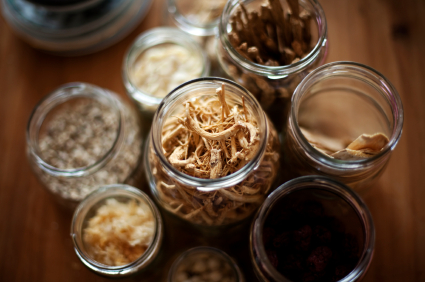Chinese Herbs and Nutrition
Chinese medicine is an intricate and ancient system using plant, animal and mineral substances found in nature to address and prevent ailments. We use nutrition as well as herbs to rectify internal imbalances that trigger symptoms and disease. This form of healing dates back probably even longer than acupuncture, with over 5,000 years of use.  Foods and herbs are almost indivisible in Chinese medicine, as many herbs are concentrated fruits and plants that may be eaten as part of our daily diet, and food can be as powerful a healing tool when done in a manner supportive to our constitution. (You guessed it – no hamburgers or milkshakes in these formulas!)
Foods and herbs are almost indivisible in Chinese medicine, as many herbs are concentrated fruits and plants that may be eaten as part of our daily diet, and food can be as powerful a healing tool when done in a manner supportive to our constitution. (You guessed it – no hamburgers or milkshakes in these formulas!)
Both herbs and foods are divided into five tastes: pungent (or acrid), sweet, sour, salty and bitter. Each taste targets a different organ system and has a different action in the body. You may notice that particular cravings signal imbalances in the corresponding organ system:
- Pungent (Acrid) taste enters the Lungs and Large Intestine. They may induce perspiration and/or enhance energy circulation. Some examples of pungent foods are ginger, green onion, black pepper, chive, cinnamon twig, dill seeds, fennel, garlic, ginger and peppermint;
- Sweet taste enters the Spleen and Stomach. Overindulgence in sweets leads to weight gain by throwing the digestive system out of balance. In moderation, nature’s sweet foods can moderate toxicity and improve digestive function. Some examples of sweet foods include watermelon, honey, apples, apricot, bananas, carrots, celery, cherry, chestnuts, eggplant, figs, kidney beans, and many grains (no, candy bars don’t exactly qualify as medicinal here);
- Sour taste enters the Liver and Gall Bladder. Sour foods are astringent (absorbing fluids), making them useful in stopping perspiration or diarrhea. Examples of sour foods are lemons, plums, green apples, apricots, grapes, grapefruits, mandarin oranges, mangoes, olives, peaches, pineapples, raspberries, adzuki beans, strawberries, tangerines, tomatoes, and vinegar.
- Salty taste enters the Kidneys and Urinary Bladder. Salty foods soften hardness, which can be useful in treating nodules or glandular hardening. Kelp, seaweed, abalone, barley, clam duck, oyster, and pork are great examples of salty foods.
- Bitter taste enters the Heart and Small Intestine. Bitter foods clear heat (reduce fever), dry body fluids and can induce diarrhea. Common bitter foods include asparagus, wild cucumber, celery, coffee, kohlrabi, radish leaf, vinegar and wine.
Specific foods might be recommended (or advised to avoid) as part of your healing plan to accomplish specific actions in your body, including moistening dryness, drying dampness, warming or cooling the body. For example, did you know cold foods and drinks are especially damaging to your digestive energy?
 In much the same way as foods, Chinese herbs are categorized and combined according to their tastes and temperatures. This enables the herb or herbal formula to enter specific organs and achieve specific balancing actions in the body, making them much more targeted to a specific area than western pharmaceuticals. There is a very interesting and growing field that studies the pharmacological actions of Chinese herbs and their use in reducing the dosages and moderating the toxicity of pharmaceuticals. Like drugs, they can be broken down into actions such anti-inflammatory, analgesic, antipyretic, etc. However, different from pharmaceuticals and even most health food store herbs, Chinese herbal formulas work on the underlying root problem, rather than treating or masking symptoms (acupuncture’s partner with the same Mission Statement!)
In much the same way as foods, Chinese herbs are categorized and combined according to their tastes and temperatures. This enables the herb or herbal formula to enter specific organs and achieve specific balancing actions in the body, making them much more targeted to a specific area than western pharmaceuticals. There is a very interesting and growing field that studies the pharmacological actions of Chinese herbs and their use in reducing the dosages and moderating the toxicity of pharmaceuticals. Like drugs, they can be broken down into actions such anti-inflammatory, analgesic, antipyretic, etc. However, different from pharmaceuticals and even most health food store herbs, Chinese herbal formulas work on the underlying root problem, rather than treating or masking symptoms (acupuncture’s partner with the same Mission Statement!)
Because they are administered as blends of herbs, they work much more deeply on a whole pattern of imbalance, addressing multiple symptoms at once. This means they are not generally needed beyond the period of time it takes the body to achieve balance. Again, because we’re using blends here, they don’t generally lose effectiveness as the body never adapts to them, and there are almost no side effects when administered properly by a Licensed Chinese Herbalist. That said, don’t try to self-prescribe. It takes years of study and an understanding of Chinese medical diagnosis to get safe and effective results. Even if you’re not coming for acupuncture, you’re always welcome to come for an Herbal Consultation.




